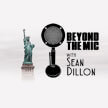Welcome Lindsey:
We’re joined on the Starline by a medical historian, TV host and bestselling author. Her first book was “The Butchering Art” now she introduces up to “The Facemaker”. We welcome back our friend Dr. Lindsey Fitzharris.
Lindsey, let’s go Beyond the Mic. Your first “hero” Joseph Lister turned into a villain for your second novel’s “hero”. How did that discovery change the way you saw both these characters?
Growing up my dad would always tell me when I skinned my knee to rub some dirt in it and move on. In the case of French soil it could have been deadly.
Dr. Harold Gillies restored faces using skin grafts which was revolutionary at the time. How are some of the techniques he created still being used today?
Gillies before trying surgery wanted the men’s strength to be at their peak and specific attention was given to their diet. Never thought diet would be important for plastic surgery.
Both you and Gillies went to Oxford. How easy was it to do research on him?
So, you are trying to get to the meat of the story. People don’t understand what you do and the importance of your job. Most of the time people ask ‘That’s a real job?’ How have you transformed the image of what a medical historian does?
As a medical historian COVID-19 was predictable?
The Rockin’ 8:
It’s time for the Rockin’ 8, 8 random questions; answer with the first thing that comes to your mind. There is no Pressure.
1. Have you ever had Chicken Pox?
2. What’s the oddest job you ever took to earn money?
3. What is really complicated about your life?
4. If you discovered a new breed of dinosaur what would you name it?
5. Which movie do you wish life was more like?
6. Which job would you want if you could have any?
7. Favorite place in Bloomington Illinois?
8. If you could rule a country, what would be your first decree?
The Back Half with:
During World War 1 Gillies was attempting to give these people dignity so they could walk down a street without being pointed at and considered a monster. The initial masks he made could flake off. He was trying to make them feel human. Now plastic surgery is being used so people point at them. How does this dichotomy of these two historical times make you feel?
Have you ever considered plastic surgery?
Growing up in Mount Prospect, and graduated from Illinois Wesleyan. How did your time in Chicago help you and your passion for science?
The Greatest Generation:
How has your research of this book help you have a greater appreciation for the greatest generation?
What thing of yours would you want preserved for history?
Your initial book was shortlisted for several prizes. Millions of people have heard you on podcasts, read your blog. What gives you joy about researching and writing and being able to share these stories?
Finding you online is easy if you search dissection, embalming, rotten corpse, human meat.
With such a unique passion for your work, how odd are your fans?
One thing people don’t know about you that would shock them?
Your husband Adrian is a cartoonist, what drew him to you? What made you say “yeah, that guy”?
The Facemaker:
Gillies gave to his patients all he had till he had a stroke during a surgery at the age of 78. What are your thoughts on his never ending quest to heal & humanize those who were in pain and suffering?
What do you want to tell a young girl to motivate her to follow down your path?
One Big Question:
You have survived a failed marriage, almost being deported, people ignoring your work and now you’ve have a TV show, a bestselling book and is considered one of the tops in your field. How has your resiliency grown? How have you grown through failure?
Where can people find you?
The Wrap:
She’s has rings from the 17th century, loves buffalo chicken wings and wants you to read “The Facemaker” We thank our friend Dr. Lindsey Fitzharris for taking the time to talk to us today.
And that my friends is Beyond the Mic.
She’s on a US Tour now:
Listen to other Beyond the Mic Conversations with Authors here.
Check out her website here.
Discover more from Beyond the Mic with Sean Dillon Celebrity Podcast
Subscribe to get the latest posts sent to your email.












